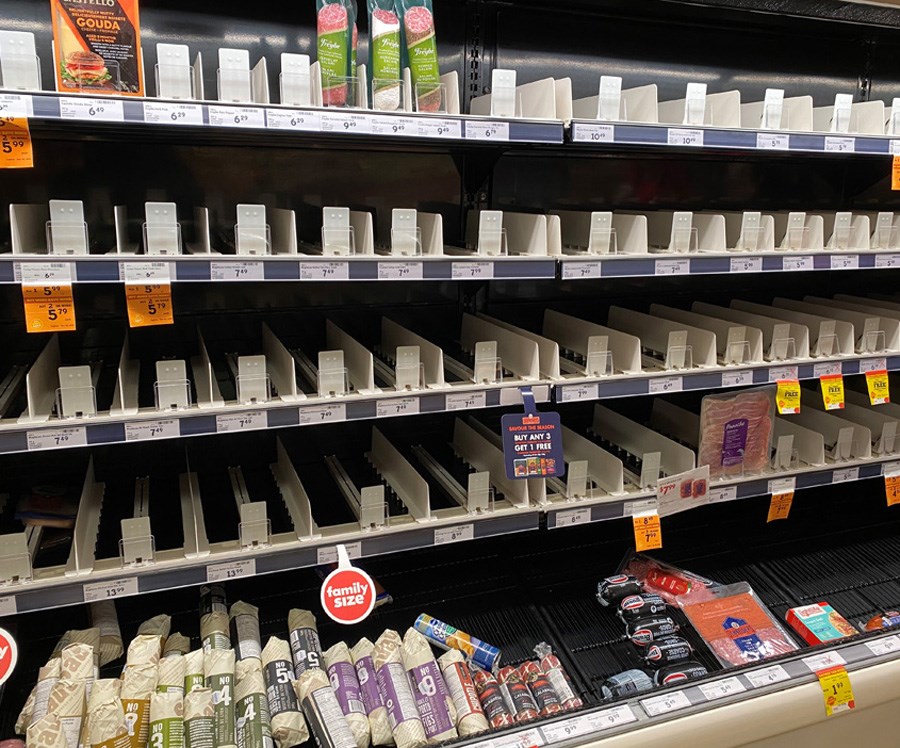“So much for my sandwich.”
That’s what I heard a dude mumble the other day as he stood in front of the deli section at a Burnaby grocery store (see the photo above).
The place was pretty much picked clean and this guy wasn’t happy about it.
I told him he could just try another store to get his luncheon meat, but he wasn’t thrilled at the hassle.
“This sucks.”
Sure. Tough life. Imagine being someone who lives in Merritt, and has had their lives ruined by the recent flooding, listening to this guy fret about his sandwiches.
This is where we stand right now. Some sections of Burnaby stores have been emptied out. According to the staff I spoke to at three different grocery stores, it’s a combination of supply issues and panic buying of certain items.
“I saw one family pretty much fill their entire basket with meat,” one staffer said. “I mean it was overflowing and they cleared out an entire section. They said they were going to freeze it.”
Look, we’re not going to run out of food here, but sure, things are getting a little tighter for some items.
With the holidays here, turkey access is expected to be most difficult in B.C., where flooding has closed highways and affected the transport of all kinds of goods, including turkeys. B.C.'s Lower Mainland is also a key agricultural region for the province, which is responsible for 13 per cent of Canada's overall turkey production.
It's unclear exactly how many birds were lost when floodwaters left barns and farms under metres of water earlier this month. Michel Benoit, general manager of B.C. Turkey Farms, says just two of the province's 64 turkey growers are located in the flood evacuation zone.
It's unclear just how stressed the turkey supply chain in B.C. will be this holiday season, said Maegan McKimmie, spokeswoman for the national industry group Turkey Farmers of Canada, in an email. She said farmers, processors and retailers are working together to address the implications of the flooding disaster.
McKimmie added there is "no question" there is less supply across the country this year, though she said there's no reason for home chefs to be alarmed.
"We do not think consumers should panic-buy their turkeys this Christmas," she said. "(They) should be able to buy when needed."
One thing industry experts agree on, Canadians should expect to pay more for that turkey when they find it. Just as shoppers saw at Thanksgiving, prices for turkey are up as much as 25 per cent year-over-year due to the extreme drought last summer that withered wheat and other feed crops across the Prairie provinces.
B.C.'s already hobbled supply chain could encounter another setback this week if container truck drivers at two companies serving the Port of Vancouver follow through with a plan to strike on Friday.
Labour union Unifor says it has told Aheer Transportation and Prudential Transportation that almost 200 of their drivers will walk off the job later this week, if they aren't offered better employment terms.
Unifor estimates the strike would impact about 170 trucks or about 10 per cent of the vehicles servicing the Port of Vancouver, which has been in the spotlight since mid-November storms flooded many transport routes in B.C.
Canadian National Railway Co. said on Monday that it had stopped some of its service along the southern B.C. freight corridor because rain was causing increased debris, washout and landslide activity.
CN diverted some rail traffic to the Port of Prince Rupert, but both northbound and eastbound traffic to and from Vancouver were still affected.
Meanwhile, Canadian Pacific Railway Ltd. was able to bring grain and fuel shipments to Vancouver last Wednesday for the first time in days.
So there are definitely bumps in the road happening, but rushing out to a store to stock up isn’t the best plan right now.
- With files from the Canadian Press



